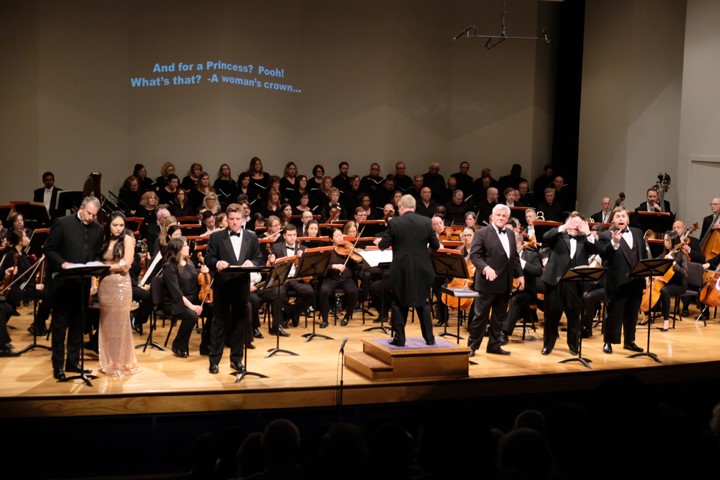Giacomo Puccini was briefly revived at Northern Kentucky University’s Greaves Concert Hall this weekend. This bit of magic took the form of “Turandot” in concert, performed by the Kentucky Symphony Orchestra under the direction of J.R. Cassidy. “Turandot” was Puccini’s final opera, and he died before completing it. Knowing the end was near, Puccini pulled out all the stops and wrote some of the most glorious, heart-wrenching music ever put to paper—there’s a good reason “Nessun Dorma” remains one of the best-known arias in all of opera. His work is in good hands with the Kentucky Symphony Orchestra. Jeffrey Springer handles the famous aria with confident grace, and Mr. Cassidy took ambitious steps to ensure that the spectacle of the overall opera was not lost on the audience.
At several points throughout “Turandot,” characters refer to trumpets calling out to the citizens of Peking (now Beijing). When they did so on Saturday, a brass section answered their calls from behind and above the audience in the “crow’s nest.” The effect was dizzying, providing just the right bit of pomp to put listeners on edge, much in the same way that citizens might be under the cold rule of Princess Turandot. At somber moments, the Cincinnati Children’s Choir’s Bel Canto Choir suddenly appeared, marching through the mid-section of the auditorium and filling the venue with a delicate sound
It has to be said that the plot of “Turandot” does not necessarily hold up to modern cultural mores. The story is rooted firmly in the “Love Conquers All” storytelling tradition, which overlaps uncomfortably with the idea that love, specifically, conquers women. Turandot is a princess of Peking who inherits a vengeful rage on behalf of her ancestor, a ruler known for purity who was taken away by foreign conquerors. Every suitor who seeks her hand in marriage must sound a gong three times then correctly answer three riddles. Anyone who fails to answer all three correctly is summarily beheaded.

A prince of Tartary arrives in town just as one such execution is taking place. Seeing Turandot (as she demands a suitor’s head), he falls instantly and inexorably in love. Despite the protests of his father, his father’s slave-girl Liù and three hilarious ministers, he commits to facing the riddles himself. By the end of the second act, he solves the riddles, but is not content with simply winning Turandot’s hand. A kind reading of the story would say he also wanted to win her heart, but let’s face it: the prince’s goal leans more into possession. He offers a riddle of his own. If Turandot can guess his name by morning, he will submit to the executioner’s axe. Turandot commands everyone in Peking to find his name or be killed themselves.
In their desperation, the people cause Liù, who is not-so-secretly in love with the prince, to kill herself. This setup has all the workings of a great tragedy, especially given Yuji Bae’s excellent, emotive performance as Liù. In fact, such an ending has been performed. However, the traditional ending has Prince Calaf reveal his name just before dawn, Turandot immediately shucking her convictions and the two living happily ever after. The final moments of the score swell into an echo of “Nessun Dorma,” with such a magnificent wall of sound that it’s surprisingly easy to give the decidedly unempowering ending a pass. That’s a testament, not only to the undisputed genius of Puccini, but to the incredible talent of the Kentucky Symphony Orchestra.
Zach Moning is the communications manager at ArtsWave. Reach him here with questions or comments about ArtsWave Guide.